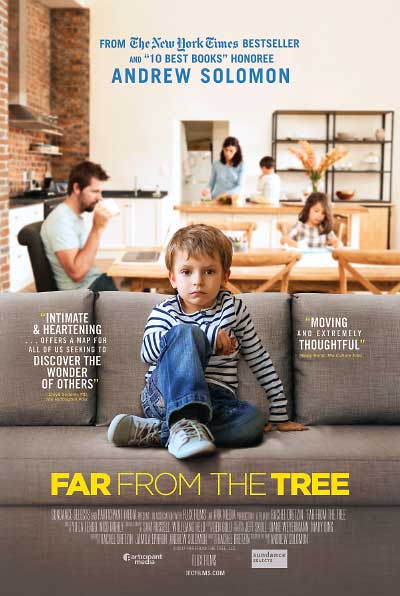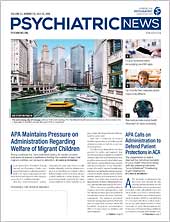“The stories I was exploring at first felt alien,” says Andrew Solomon, Ph.D., narrating the opening scenes of “Far From the Tree.” “But bit by bit they came to feel very real and intimate. In telling their stories, I came to feel I was investigating the very nature of family itself.”
The documentary, produced by Participant Media, is based on Solomon’s 2012 award-winning book about children who, in countless ways, have fallen far from that proverbial tree—because of disabilities or other defining characteristics that make them “different” from their parents. They and their parents—who may have hoped for and planned on having a “normal” child—travel a difficult path to acceptance. And in the happiest of these stories, the parents eventually discover what they could not have predicted from the beginning: that they love the child, not in spite of his or her “difference,” but because of it.
“The stories are examples of extreme family situations where parents have to be more self-sacrificing than usual, put their own expectations on hold, and come eventually to see their children as completely separate beings,” Solomon told Psychiatric News. “That’s essentially the story of every family though—being a parent is always a process of coming to embrace your child with whatever flaws or differences they have.”
A prolific writer and speaker who has presented at the APA Annual Meeting, Solomon is a clinical professor of psychology at Columbia University Medical Center.
The movie opens in New York and Los Angeles this month and will be rolled out to select theaters in the coming weeks and on many cable systems offering “view on demand.”
The film tells this tale through the stories of a man with Down syndrome; a young boy with autism; a dwarf and her romance and marriage to a paraplegic; and a teenager who has committed a murder. And weaved in and out of these stories is Solomon’s own story of coming out as gay—to his parents, who were initially devastated and rejecting, but also to himself—a story that was by his own accounting a long and tortured one, involving desperate attempts to cease to be gay through “sexual surrogate therapy.”
Solomon said that even after homosexuality was removed as a disorder from the DSM in 1973, it remained for years a stigmatized condition. “Being gay may not have been a catastrophe, but it was nonetheless undesirable,” he said. “Psychotherapy has been enormously helpful in self-acceptance. I think the message is that the responsibilities of the psychiatrist, as for the parent, are in part to help people change and in part to help them celebrate who they are.”
Or as Solomon says in “Far From the Tree”: “I began to wonder whether ‘defectiveness’ itself wasn’t a matter of perspective. How do we decide what to cure and what to celebrate?”
Today, Solomon is married (to journalist John Habich) and a father; the movie depicts his own father toasting Solomon’s marriage at their 2009 wedding.
APA’s Council on Communications has endorsed the documentary. “The stories in the documentary version of ‘Far From the Tree,’ like those in the book, carry a powerful message of resilience and affirmation,” said past APA President Carol Bernstein, M.D., chair of the council and a professor of psychiatry and neurology at NYU. “We endorsed the film because that message is one that patients with mental illness and those who care for them, as well as the general public, need to hear. Our patients and their families, like the families depicted in the movie, frequently struggle to overcome a painful sense of being different from others and of feeling ashamed of who they are. We urge patients, their families, and psychiatrists to see ‘Far From the Tree.’ It is a moving testimony to the best of our humanity.”
Lloyd Sederer, M.D., vice chair of the council and the chief medical officer of the New York State Office of Mental Health, called it “one of the most beautiful films I have seen in a long time, and powerfully anti-stigmatizing.” He added, “This is a film about differences and how individuals and families discover their identity.”
The story of “Jack,” a boy with autism, is especially powerful: the movie vividly renders a portrait of a child trapped in a body that won’t cooperate with his efforts to communicate with the outside world. Painstakingly, he learns to type out messages on a message board; the first breakthrough is when he types out: “I am trying, and I am really smart.”
It is a compelling moment. “It was like I was meeting him for the first time,” his mother said.
The story that some may find the most challenging to view without judgment is the portrait of a teenager who, for no apparent reason, kidnapped an 8-year-old boy and slit his throat. For the book version, Solomon had interviewed the parents of Dylan Klebold.
“I became very interested in the common notion that parents have somehow turned their child into a criminal—that they must have done something to make their child a criminal,” Solomon said. “But it may be that just as a parent can’t prevent a child from being a dwarf, so they may not be able to prevent a child from being a criminal. And yet even after the child has done the worst thing imaginable, a parent just can’t stop loving a child. The parents in the film have the perpetual conundrum of being horrified by what their child had done, unable to change it, and at the same time remaining deeply committed to the child.”
Everyone will have his or her own “favorite” story, and Solomon said that people resonate with different aspects of the film. “People who have seen the film tell me it made them feel less lonely,” he said. “Being a child with a difference is a very isolating experience. I hope the movie gives some sense of the universality of this experience of parenting, and of arriving at a place of acceptance of one’s own difference. ■
Sederer’s review of the documentary is available
here. The documentary’s trailer can be watched
here. The documentary can be viewed on demand on many cable networks starting July 27.

